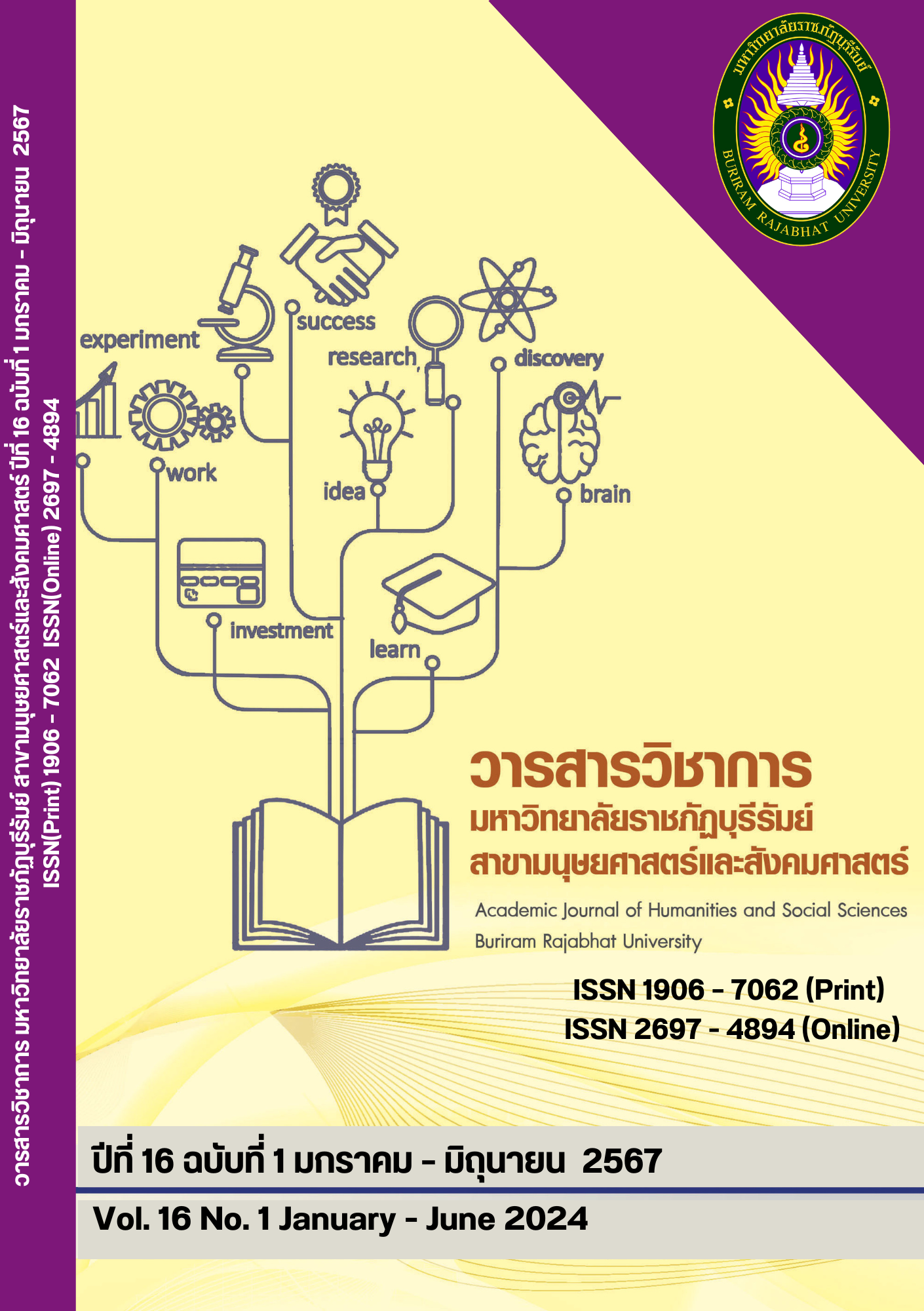Enhancing Vocabulary Knowledge in Thai Primary School Students Through Activity-Based Learning Instruction
Main Article Content
บทคัดย่อ
This study explores the effect of using activity-based learning instruction to enhance vocabulary knowledge among Thai primary school students. It also aims to assess the students’ attitudes towards learning vocabulary through this instructional approach. The participants were 25 sixth-grade students at Nonchantuekhuaykaewittaya School in Wangyai District, Khon Kaen. Data were collected and analyzed using three research instruments: 1) activity-based learning instruction, 2) pre- and post-vocabulary tests, and 3) questionnaires. The findings revealed that after implementing activity-based learning instruction in the vocabulary classroom, the participants’ vocabulary knowledge improved significantly at the 0.05 level of statistical significance. Additionally, the participants demonstrated positive attitudes towards the instruction and agreed that activity-based learning is effective in improving vocabulary knowledge in terms of form, meaning, and use.
Article Details

อนุญาตภายใต้เงื่อนไข Creative Commons Attribution-NonCommercial-NoDerivatives 4.0 International License.
- ต้นฉบับที่ได้รับการตีพิมพ์ในวารสารวิชาการ มหาวิทยาลัยราชภัฏบุรีรัมย์ สาขามนุษยศาสตร์และสังคมศาสตร์ ถือเป็นกรรมสิทธิ์ของมหาวิทยาลัยราชภัฏบุรีรัมย์ ห้ามนำข้อความทั้งหมดหรือบางส่วนไปพิมพ์ซ้ำเว้นเสียแต่ว่าจะได้รับอนุญาตจากมหาวิทยาลัยฯ เป็นลายลักษณ์อักษร
- เนื้อหาต้นฉบับที่ปรากฏในวารสารเป็นความรับผิดชอบของผู้เขียน ทั้งนี้ไม่รวมความผิดพลาด อันเกิดจากเทคนิคการพิมพ์
เอกสารอ้างอิง
Aegpongpaow, O. (2008). A qualitative investigation of metacognitive strategies in Thai students’ English academic reading. Master of Arts Thesis, Srinakharinwirot University, Thailand.
Adunyarittigun, D. (2021). Metacognitive Awareness of Reading and Reading Strategy Use by Nonproficient College Readers. REFLections, 28(1), 82–106.
Anwer, S. (2019). Activity-based teaching, student motivation and academic achievement. Journal of Education and Educational Development, 6(1), 154-170.
Bornmann, S. M.,Napark, W., & Wajanatinapart, P. (2021). Effects of activity-based learning on English knowledge, reading and writing skills and attitude towards learning elf nursing students. Journal of Health Science Research, 15(1), 35-46.
German, E., & Lestari, D. (2020). The Implementation of Activity Based Learning (ABL) Method at Elementary School to Enhance Students' Speaking Skills. International Journal of Community Service Learning, 4(3), 223-228. doi:http://dx.doi.org/10.23887/ijcsl.v4i3.23939.
Kuyate, P. (2019) A study of effectiveness of activity-based teaching method in the English subject of Standard IV. Educational Resurgence Journal, 1(1), 46-52.
Lewis, M. (1993). The lexical approach: The state of ELT and the way forward. Hove, England: Language Teaching Publications.
Liangpanit, J. (2014). What Do Students Think about Vocabulary Exercise? Journal of education Naresuan University, 16 (1), 172-179.
Mameesuk, S. (2021). The study of learning achievement in learning English vocabulary by using a picture word inductive model. Journal of Modern Learning Development, 6(5), 12-26.
Nation, I. S. P. (2001). Learning vocabulary in another language. Cambridge: Cambridge University Press.
Platapiantong, T. (2019). The development of vocabulary learning achievement and retention using mnemonics and vocabulary picture books for grade 6 students of Anuban Nakhon Pathom School. (Master’s independent study paper Silpakorn university). Graduate School, Silpakorn University.
Plianpran, N., & Nakjan, S. (2015). Learning English vocabulary games performed by Prathomsuksa-6 students at Wat Toongnoi school in Kuiburi District, Prachuap Khiri Khan Province. Veridian E-Journal, Silpakorn University, 8(2), 1672-1684.
Schmitt, N. (2000). Vocabulary in language teaching. Cambridge: Cambridge University Press.
Srimanee J, Laohawiriyanon C. (2010). Vocabulary Learning Strategies of Thai Grade 9 EFL Students. Paper presented at the 2nd International Conference on Humanities and Social Sciences April 10, 2010. Faculty of Liberal Arts, Prince of Songkla University, Songkla, Thailand.
Suttanon, C. (2018). An investigation on using activity-based learning to enhance English speaking ability of primary 3 students in a private Bangkok school. Master of Arts Thesis in English language teaching, Language Institute, Thammasat University.
Talabklang, P., & Thienpermpool, P. (2019). The development of vocabulary learning achievement using activity-based learning for Prathomsuksa 2 students of Wat Khian Khet School, Pathum Thani Province. Rajapark Journal, 13(31), 195-208.
Wesche, M., & Paribakht, T. S. (1996). Assessing Second Language Vocabulary Knowledge Depth vs. Breadth. Canadian Modern Language Review, 53, 13-39.
Wilkins, D. A. (1972). Linguistics in language teaching. Cambridge: MFT Press.
Withiprod, P. (2009, August, 30). Problems in using English. Matichon Rai Wan, pp.7.


